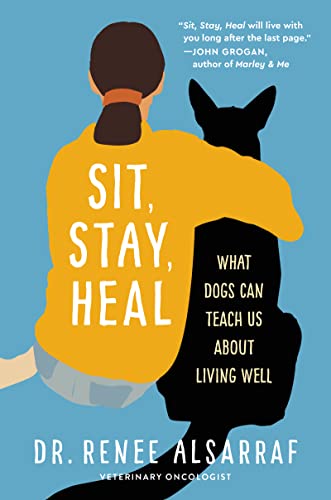Sit, Stay, Heal: What Dogs Can Teach Us About Living Well

“Perhaps dogs can’t teach us how to live but, by their joyful presence and abundant love, they help us live better.”
A doctor is afflicted with the same disease she treats in her patients in Sit, Stay, Heal: What Dogs Can Teach Us About Living Well by Renee Alsarraf, a veterinary oncologist. The book juxtaposes Alsarraf’s experience as a cancer patient with stories of dogs in her practice. The differences between cancer treatment in dogs and humans are significant, Alsarraf explains, and not just because her patients come to appointments dressed in costume and drooling from the jowls.
Dogs receive relatively smaller doses of chemotherapy and radiation than humans do, with the goal of lengthening and improving life rather than curing the disease. As a result, dogs often breeze through chemo with no side effects. They may live an additional six months or six years in remission, but the cancer typically comes back.
The colorful variety of dog patients Alsarraf describes includes a police bloodhound, a mob boss’s German shepherd, and a cocker spaniel who alerts her family to their daughter’s seizures. Alsarraf methodically lays out the treatment options to each family, rattling off statistics on success rates for each alternative.
In Alsarraf’s descriptions of her practice, the book reads like a glossy brochure: animals receive treatment tailored to their needs, meticulously administered, and the staff adore each bundle of fur who trots merrily through their doors. The vet gives out hugs like prescriptions, and no one cries alone.
Stories of adorable, talented, and well-mannered dogs and their “pet parents,” as the author calls them, are interspersed with more sober episodes from Alsarraf’s own cancer treatment. Given her profession, Alsarraf is surprisingly squeamish about her disease, referring to it as “the C word.” Of all the upsetting consequences of the treatment, losing her hair bothers her the most. That’s another difference between human and animal chemo—animals don’t lose their fur.
Alsarraf has uterine surgery and then begins both chemotherapy and radiation for a metastatic lesion. Her husband and teenage son fend for themselves while she stays on the couch for hours at a time, achy and depleted. In a remarkable convergence of cancer in her world, Alsarraf’s beloved boxer develops a malignancy during her treatment, and she sends him for chemotherapy at her clinic.
Fully in control within the walls of her veterinary office, Aslarraf suffers from the uncertainty of being the patient. No doctor gives her outcome probabilities; no one suggests an array of other options. At her first treatment, she grills her chemo nurse with a list of questions, desperate to feel more informed and prepared for what’s to come.
Despite the grim circumstances, despair never creeps into Alsarraf’s story. “I fight as a matter of principle,” she writes. “I will be the one who goes down with the ship, or at least knows when to man the lifeboats. Perhaps that’s a good quality to look for in an oncologist, whether for humans or for animals.”
Dogs, on the other hand, don’t fight their cancer, because they never know they have it. A lack of worry, Alsarraf suggests, is the biggest lesson to be learned from her canine patients, although one that seems particularly unrealistic for humans. Count Alsarraf as one who still worries. After her successful treatment, she describes checkups as stressful events “to face my mortality quarterly.”
Dog lovers will find some of the stories in this book charming, but insights about what dogs can teach us are few. Unlike dogs, humans suffer the anxiety of the future’s uncertainty, but we can also imagine ourselves away from the present. Alsarraf writes, “As much as I would like to emulate my animal patients’ ability to live in the moment, sometimes that moment is really hard to take.”
Perhaps dogs can’t teach us how to live but, by their joyful presence and abundant love, they help us live better. The outcome of each cancer case, despite knowing the odds, is ultimately unpredictable. What stays consistent throughout Alsarraf’s stories is the unconditional devotion of each family to its beloved pet.